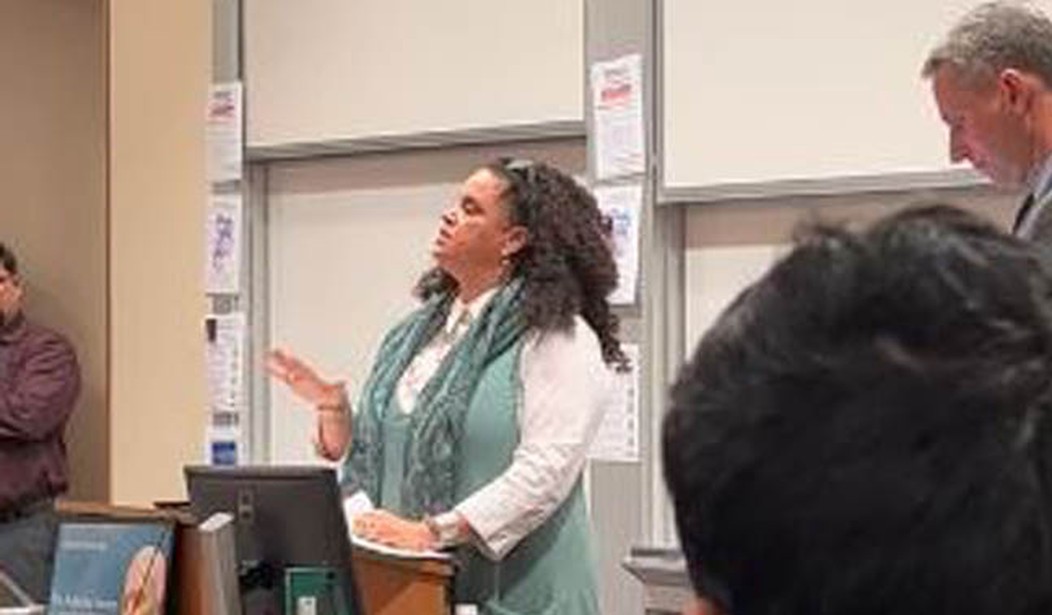We learned yesterday that DEI dean Tirien Steinbach has been placed on leave. Law School Dean Jenny Martinez didn’t say what would happen to Steinbach next but did make it clear that she found fault with Steinbach’s behavior during the meeting. In fact she concluded that it wouldn’t be fair to punish the students in the room because dean Steinbach had made such a muddle of what was expected of them.
In this instance, however, the failure by administrators in the room to timely administer clear and specific warnings and instead to send conflicting signals about whether what was happening was acceptable or not (and indeed at one point to seemingly endorse the disruptions that had occurred up to that point by saying “I look out and say I’m glad this is going on here”) is part of what created the problem in the room and renders disciplinary sanction in these particular circumstances problematic.
If Steinbach has any concern that she’s going to be disciplined or even fired for this she’s not showing it. Today the Wall Street Journal published her account of her actions at the speech which completely ignores the criticism from dean Martinez. On the contrary, Steinbach continues to maintain she did nothing wrong.
I stepped up to the podium to deploy the de-escalation techniques in which I have been trained, which include getting the parties to look past conflict and see each other as people. My intention wasn’t to confront Judge Duncan or the protesters but to give voice to the students so that they could stop shouting and engage in respectful dialogue. I wanted Judge Duncan to understand why some students were protesting his presence on campus and for the students to understand why it was important that the judge be not only allowed but welcomed to speak.
To defuse the situation I acknowledged the protesters’ concerns; I addressed the Federalist Society’s purpose for inviting Judge Duncan and the law school’s desire to uphold its right to do so; I reminded students that there would a Q&A session at which they could answer Judge Duncan’s speech with their own speech, as long as they were following university rules; and I pointed out that while free speech isn’t easy or comfortable, it’s necessary for democracy, and I was glad it was happening at our law school.
I think most of that is true but as with a lot of left-wing journalists, the real story lies in what Steinbach left out. For instance, she doesn’t mention some of the truly vile things students said to Judge Duncan (including wishing his daughter would be raped). She doesn’t mention that she had a pre-written speech which suggests she knew the disruption was coming in advance. She omits that her own statements to Judge Duncan clearly indicated she agreed with the students that he was causing harm.
At one point during the event, I asked Judge Duncan, “Is the juice worth the squeeze?” I was referring to the responsibility that comes with freedom of speech: to consider not only the benefit of our words but also the consequences. It isn’t a rhetorical question. I believe that we would be better served by leaders who ask themselves, “Is the juice (what we are doing) worth the squeeze (the intended and unintended consequences and costs)?” I will certainly continue to ask this question myself.
Steinbach offers no apology to Judge Duncan and demonstrates that even days later she doesn’t have a clear understanding of the school’s speech policy or of how she personally failed to live up to it. To put it bluntly, she failed in her main job that day. It wasn’t enough to say that Judge Duncan deserved space to speak. As the administrator representing the school, it was her job to make sure that space actually materialized. She had one job and she failed. Instead of acknowledging that failure, she’s still looking to argue the point. “How we strike a balance between free speech and diversity, equity and inclusion is worthy of serious, thoughtful and civil discussion,” she writes in her final paragraph, as if the boundaries of free speech at Stanford are still up in the air.
I was hesitant to call for Steinbach’s firing early on but at this point she is all but daring dean Martinez to fire her. She’s refusing to accept any blame for her own behavior and she’s promising she’ll behave exactly the same way the next time a similar situation arises. So if Martinez was serious about the criticism she expressed yesterday she ought to acknowledge that none of it is getting through so far. And if she wants to be really honest she could also acknowledge that failing to stand up to dean Steinbach after she refuses to take responsibility will only encourage more bad behavior from the students who are waiting to see how this shakes out.







Join the conversation as a VIP Member